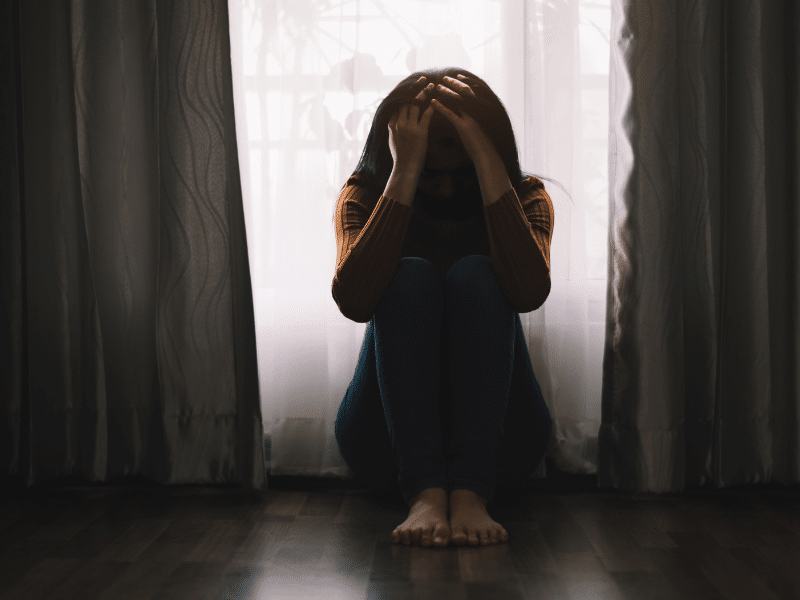 will come straight out and say that I battle depression. I have battled depression on and off most of my life. In sixth grade I had a horrible school environment and I didn’t know how to deal with what was happening around me, so I felt myself slowly turning inward a bit more every day. I thought about killing myself, and how that would take away everything I was dealing with in an instant. My parents were at a loss as to what to do to help me. They tried some counseling that I pretended was doing the trick because I hated it immensely, but at the end of the school year, my parents decided the best course of action was to find a new school in a new city, and that actually helped pull me out of the depths of my despair (and yes, even at that young age, that’s what I was feeling) and I got my life back on track. I had bouts of depression that, thankfully, didn’t last long through the rest of my school years, but it reared its ugly head terribly after I gave birth to each of my first two children, and again in recent years when dealing with some very difficult personal matters. I am happy to say that now, through a combination of medication and talk, I am doing ok. But, sadly, I can’t say the same for all of my children.
will come straight out and say that I battle depression. I have battled depression on and off most of my life. In sixth grade I had a horrible school environment and I didn’t know how to deal with what was happening around me, so I felt myself slowly turning inward a bit more every day. I thought about killing myself, and how that would take away everything I was dealing with in an instant. My parents were at a loss as to what to do to help me. They tried some counseling that I pretended was doing the trick because I hated it immensely, but at the end of the school year, my parents decided the best course of action was to find a new school in a new city, and that actually helped pull me out of the depths of my despair (and yes, even at that young age, that’s what I was feeling) and I got my life back on track. I had bouts of depression that, thankfully, didn’t last long through the rest of my school years, but it reared its ugly head terribly after I gave birth to each of my first two children, and again in recent years when dealing with some very difficult personal matters. I am happy to say that now, through a combination of medication and talk, I am doing ok. But, sadly, I can’t say the same for all of my children.
For years we have battled some demons in our home. Without going into personal details, I have three children who suffer from severe depression. All three have talked about suicide, one has even started to attempt it. One of the scariest moments I have had as a mother was physically restraining and holding my child down while they begged me to let go and let them die. All three have been through a combination of therapy and medication, and as of now, we seem to have found the magic combination for each.
The worst thing about it is, in each case, I can honestly say I didn’t see it coming. I am a fairly vigilant Mom, but I was unaware how my children were suffering, how they wanted to find a way out, even if it meant death. I should have known – I’d been there myself. But time sometimes blurs our vision to the truth that is right in front of us.
According to a Feb. 2015 article, Indiana has the highest rate in the U.S. of teens who have considered suicide, and the second highest rate of teens who have attempted it. Suicide is the leading cause of death among individuals age 15 – 24. Last year in the Indianapolis area alone, there were multiple teen suicides, including two at my daughter’s high school. It isn’t limited to teens, though. There have been six and seven year old children who have committed suicide. So many times we, as parents, think “Oh, it’s just a phase”, but that’s far too often not the case.
Many of the signs and symptoms of childhood depression can be found in almost any child from time to time, or are symptoms of other issues, including irritability and increased sensitivity, change in appetite, change in sleep patterns, difficulty concentrating, low energy, mysterious physical complaints. But not all children will have all these symptoms, or may show different symptoms in different settings. Some children will show obvious signs of withdrawal or major mood swings. Some children, especially as they get older, may hide their feelings, or “put on a happy face” as my child did.
It is so important that as parents we are vigilant and watch for even the smallest changes in our children, as difficult a task as that may be. Children with a family history of depression are at greater risk of experiencing depression themselves. Children who have parents that suffer from depression tend to develop their first episode of depression earlier than children whose parents do not – realities that I discovered much later than I wish I had. One of my greatest tips to parents, especially as your children get older, is to know your child’s friends, and their parents. It was one of my child’s friends who went to his mother with his worries and the parent contacted me to fill me in on what was happening when I was totally in the dark. I have reached out to my children’s friends and their parents and asked them, without betraying my child’s confidence, to please watch out and let me know if anything is going on. I think the greatest fear any mother has is losing her child, especially if it could have been prevented. I have looked that fear in the face, and hope that I have become a strong ally in my children’s battles with depression as a result.
If you or someone you know is struggling with depression and thoughts of suicide, contact the National Suicide Prevention Lifeline at 1-800-273-TALK (8255) to be connected to a skilled, trained counselor at a crisis center in your area, anytime 24/7. You can also visit their website at www.suicidepreventionlifeline.org for more information.








